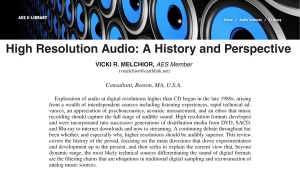| Columns Retired Columns & Blogs |
Undercurrents #1
In debates about audio, philosophy, literature, fine art, or whatever, people often adhere to either absolutism or relativism. Absolutism supposes, for example, that either analog or digital is superior and that whichever is better holds for all parties concerned. Michael Fremer, for instance, is not just advertising his opinion about the superiority of analog; he believes that everyone would acknowledge it if they paid attention to the evidence. Relativism, on the other hand, teaches that no such absolute and univocal consensus can be reached. In the end, we all have our own subjective preferences, and that, quite simply, is that. If we disagree about whether tube amps are better than solid-state, or single-ended is better than push-pull, c'est la vie.
In large part, this is what divides advocates of objective and subjective testing. The point of taking measurements, after all, is to attach objective, absolute indices to a component's performance. These measurements are "absolute" because they're transpersonal—if you and I measure sound-pressure levels at 10' from a loudspeaker with a certain test tone, we expect that our results will be nearly the same. If not, one of us goofed. But if our yardsticks are our own private experiences, there's usually little point in taking measurements. No oscilloscope can tell me better than my own ears whether or not a certain system or component will let me make contact with Ludwig or Miles or Sarah. And what works for me, of course, may not work for you.
For most Stereophile readers, all this is old hat. Judging from the letters published in this magazine, I expect that most audiophiles would have little hesitation in subscribing to one or the other school of thought. There is, however, a problem with this simple dichotomy. When we look at what we typically do and how we learn about high-end audio, neither of these pigeonholes looks too inviting. The rhetoric of absolutism and relativism, that is, does not do justice to how we carry on in the world of audio.
I'm not going to argue that there's a spectrum or continuum of positions between these two extremes, for they're logically opposed. Given any debate, we suppose that there's an absolute, objective truth we should all agree to (absolutism) or we suppose that there's not (relativism). Instead, I'll argue that these two camps are mythical. None of us really belongs to one or the other.
The basic thesis of absolutism, for example, is just false. Absolutism holds, again, that we should all fall on the same side of any particular issue. But what evidence is there that audiophiles can possibly agree that one side—analog or digital, tubes or transistors, stranded or solid-core cables, subjective or objective testing—is superior? We dress differently, eat differently, and vote differently—controversies of this sort have thrived since this hobby was born. Unless most of us are aggressively stupid, or just unwilling to acknowledge the (absolute) truth, there's no reason to suppose that any such consensus is in the offing.
So, relativism must be right. I'm always suspicious of clichés and platitudes, but in this case they're apt: "different strokes..." or (my favorite) "whatever floats your boat" do a much better job of describing high-end audio. The problem with relativism, however, is that its truth comes at the expense of its practical appeal. What it recommends, after all, is a rather boring and dull approach to life in audio. Since I'll probably never convince you digit-heads that listening to LPs is more enjoyable than listening to CDs, for instance, and you'll never convince me of the reverse, there's no point in arguing. Relativism also puts the lid on subjective reviewing. Since a reviewer's appreciation of a product will have no necessary bearing on your own, put down this magazine and go audition it yourself! (See, you didn't. No one in audio is a genuine relativist.)
As I see it, neither relativism nor absolutism is a very good philosophy for high-end audio. The one is false, the other uninteresting. But are these concepts useless? No, they're not. Audio seems to thrive on a certain tension between these simple points of view—the pair, it seems, is more than the sum of the two. To illustrate what I mean, let me recount how my views about popular music were shaped by wrestling with absolutism and relativism.
Like many white suburban males growing up in the 1970s, I liked heavy metal. (Step one: "My name is George and I used to listen to Rush...") Of course I like Rush. Literary and philosophical (!) allusions in the lyrics; blazing, gymnastic musicianship; slick production—what more could an aspiring teenage guitarist, intellectual, and audiophile (with Stanton headphones) want?
At college, I still liked Rush, but only until I met Biff (yes, "Biff"—with Docksiders, Polo shirts, and parents with lots of money). One night I played the latest Rush album for a bunch of friends, including Biff. Since I had heard he was very serious about music, I asked him what he thought. "Is this just intense, or what?" I asked eagerly. He looked up from his marijuana haze (I never touch the stuff myself) and said, "It doesn't work." I didn't understand. "What do you mean 'It doesn't work'? I just played it and it worked fine." "It's all hot air," he said. "It sounds like a bunch of nimble-fingered technicians with pocket protectors trying to pack as many neat sounds and literary clichés as they can into eight-minute 'sound constructions' that have nothing to do with anything."
I was dumbstruck. Sure, I'd known lots of people who didn't care for the music I liked, but I'd never met someone intelligent (and Biff was a firecracker) who articulated specific reasons why the music of my guitar heroes was simply bad.
I felt publicly humiliated. But, like a good relativist, I was determined to convince Biff that there was something likable (to me, at least) about this music. "But don't you hear those strange chords and polyrhythmic beats? Isn't it amazing how the guitarist rips those furious yet ethereal-sounding notes out of a chunk of wood with six strings? Isn't it creative? This song has something to do with the Iliad...or something."
Biff was unmoved: "It's not rock and roll. They've confused Cream with Socrates and now they think they're artistes or cultural critics when they're really just masturbating their guitars and drums in a studio, trying to capture every 'sophisticated' riff and every 'insightful' lyric for the rest of the world to drool over. It's pretentious!"
Sensing that I could make neither heads nor tails of how he saw things, he then asked me a fundamental question: "Do you know what the phrase 'Rock and Roll' really means?" Hmmmm. It was time to change the record. Biff got up, dropped the tonearm on Exile on Main Street, and turned up the volume. I started to see his point.
That conversation changed my musical life. I started listening to The Clash, Elvis Costello, Wire, Talking Heads, and began to hear things Biff's way. Forget Homer—these guys were talking about lust, jealousy, unemployment, even fine art. ("I don't have to prove that I am creative," David Byrne sings nervously in "Artists Only."). And they meant it. So, I gave my Rush, UFO, and Styx (ugh!) albums to the computer-science major down the hall—"Really? I can just have 'em?"—and started building a real record collection. For the next few years I was a convert to absolutism. I believed there were objective standards for what was good and bad in popular music and that, up to that time, I had simply gotten it all wrong.
But this conclusion was foolish—literally sophomoric in my case. Just as it's extremely unlikely that I could convince all CD collectors that the real music's in the vinyl, there's no point in even imagining a world in which everyone prefers the same kinds of music. But relativism would not have been a good view, either. If I had succeeded in convincing Biff that what I liked about Rush was just as legitimate, satisfying, and important to me as what he liked about Mick and the boys, I might never have bought Elvis's Armed Forces or The Clash's London Calling. That would have been a crime.
The same holds true for audio. Just because we're all going to make our own different choices between analog and digital, tubes and solid-state, electrostatic and dynamic, and so on, it would be foolish to stop defending our opinions and chalk them up to mere whim or taste. We learn a great deal about our own tastes and preferences when they are challenged by others. Listening to music or appreciating a system, after all, is not a passive exercise. We can constantly teach ourselves and others about what is there to be heard and how to hear it, and these can be priceless lessons.
I rebuilt a pair of Dyna Mark III amplifiers once and was dismayed about the rather woolly bass they produced with my then speakers, the Thiel CS2s. When a friend listened, however, he pointed out what a glorious midrange they had. I had to admit he was right. My attention had been focused on that bass problem (Should I rewire? Try a different impedance output?); I had neglected to pay enough attention to the midrange. Similarly, I felt early on that the major flaw in digital was the flat soundstage, so I publicly declared analog the winner. "But what about the bass?" another friend asked. From then on I paid more attention to it and, of course, that old Magnavox wasn't quite so bad.
What fits high-end audio best, I think, is a particular and selective combination of absolutism and relativism: We should act like absolutists and proclaim our discoveries and likes and dislikes as if there were a chance to convince everyone of their absolute value. But, really recognizing this impossibility for what it is, we should think and speak like relativists. When you recommend the latest speaker to your friends, for example, don't claim that it's simply "the best for the money" or "better than Quads" and assume that they'll agree. They probably won't. Instead, recommend the component simply because you like it. That's reason enough. They may agree or disagree with you, but in either case, everyone stands to learn more about what this hobby has to offer.
Anyway, Rush came back to haunt me. Some 13 years later, I was teaching a course in 19th-century philosophy. On the first day, a student walked into class wearing a Rush concert T-shirt. Instantly, I knew what would happen: When the course progressed to the old debate over whether or not we have genuine free will (you closet Rush fans can see this coming), this student would make a point to mention their song "Free Will." Sure enough, his hand shot up—"There's a song by the band Rush that says, 'If you choose not to decide you still have made a choice,' and I think that means that we definitely have free will." I wanted to say, "Do you know what 'Rock and Roll' really means?" Instead I asked, "Do you have that on LP or CD?"
"Cassette," he said.
Footnote: George Reisch is an audiophile, a physicist, a philosopher, and a historian of science. He recently completed a Ph.D. at the University of Chicago.
- Log in or register to post comments




































